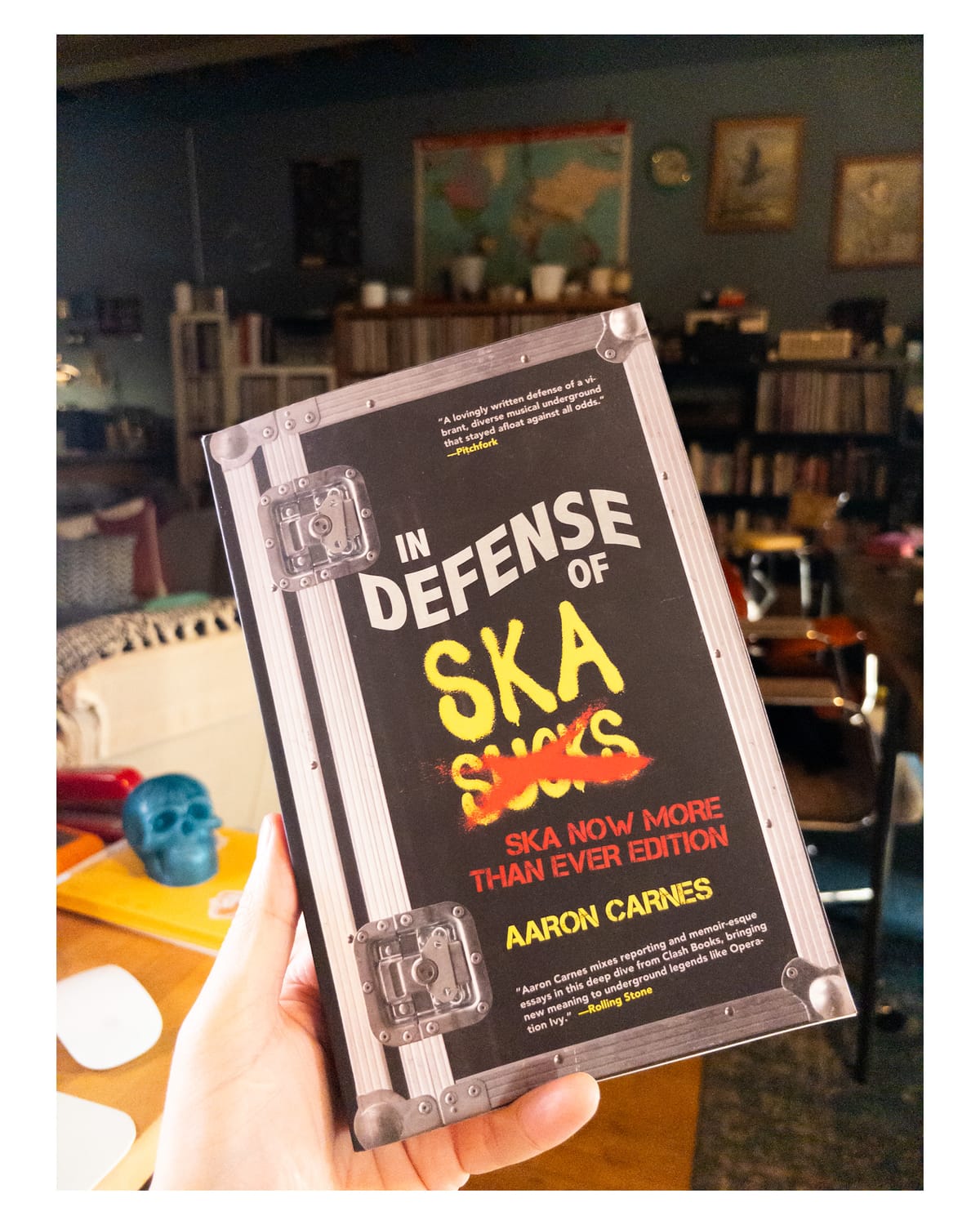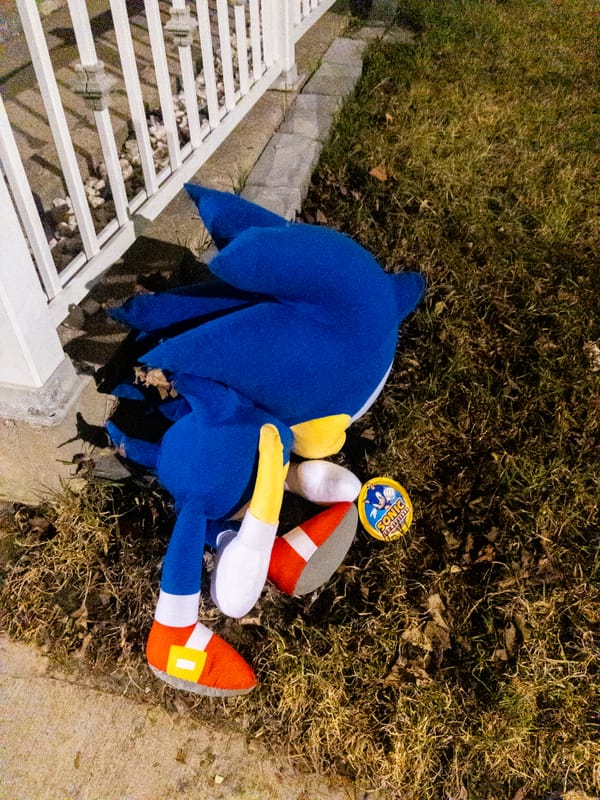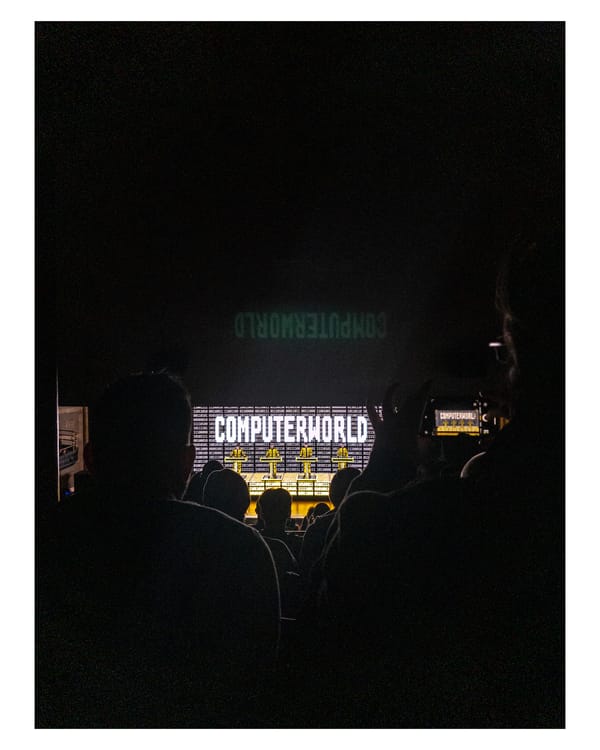In praise of In Defense of Ska

Halloween is the worst holiday for DJs. Outside the very narrow margins around the Monster Mash there are very few good danceable Halloween songs. Maybe Halloween just isn't the season for dancing, despite what all the skeletons who play their own bones as instruments will have you believe. I will never shake the memory of the night I DJed a Halloween party, I had planned to play “Thriller” right at midnight because sometimes the goal of the DJ is just to pander to the audience and get out alive. At midnight, I dropped the needle and the dance floor emptied. Some guy, let’s call him Dan even though I’m not sure that was his name, came up and asked me flat out what the fuck do you think you’re doing? I defended myself, told maybe-Dan I was playing “Thriller” because it was Halloween and this was “Thriller”, and he spilled beer on my turntables as he gestured wildly with drunken hands and half-yelled everyone here hates you. I was hurt and I was a little annoyed and in my frustration and anger, I did what every good DJ does: turned on the audience, muttered fuck these people and played the Cantina band song from Star Wars.
The dance floor filled in an instant, because fuck these people.
I’m not sure about you, but I have songs prepped and ready for the seasons as they change. When the winds shift and the leaves fall or grow or die altogether I think choosing songs and making a playlist to mark the time is helpful. Maybe this is a trick for my brain, but the thing about tricks is they often work whether they’re real or not. A seasonal playlist is a guide through moments of reliable yet uncertain change. I’m not going to tell you my entire autumn playlist, because that would be cheating a little, and mostly I believe no one really cares anyway, but there’s one song that’s always on there for the fall, and that’s “Ghost Town” by the Specials.
After I played “Cantina Band” by Figrin D’an and the Modal Nodes at the worst Halloween party in recorded history I slid into “Ghost Town”, and the dance floor emptied again except for the small handful of people who were better at being drunk than maybe-Dan and his wild and angry hands. The people who remained were blissed out and free of any desire to be perceived as anything but free. I was never that kind of drunk, and that’s only a little of the reason why I don’t drink anymore, but I always appreciated the spirit of the blissed out drunk on a dance floor, because they will dance to “Ghost Town”, and they will never worry if anyone can see them.
Dancing to “Ghost Town” is hard, because people can see you, and people will know you like ska, and that kind of thing sticks to you.
Hating on ska has been a thing for as long as I can remember. I was a committed punk in my youth and there was a delicate line with ska, it had to maintain an edge or a fury or else it slid too far into severely uncool territory. The punk rock kids I hung out with liked ska bands like Less Than Jake and Reel Big Fish because they felt more like punk rock bands with extra members, but every now and then I would slip into more earnestly ska songs, like “One Step Beyond” by Madness, or The Specials’ “A Message to You Rudy”, and fickle punks turned on me.
On their 1993 album “How To Clean Everything”, Winnipeg punk rock band Propagandhi sang “Ska Sucks”, and this became an easy refrain for punks with no love in their heart for music that lived outside the margins of what felt familiar, or what might have come before to build all the foundations we carelessly slammed our bodies on. Punks around me didn’t really care about the history of the music that built rhythm in our anxious feet, they just cared about the heat of the moment. In youth and younger years there was little time to dwell on the past when there was so much present to burn away, just yell ska sucks as loud as you can and slam together in the pit until the blood is freed from your bones.
But I’ve always wanted to know more about ska, outside of the easy jokes and the taunting derision that was tethered to any association with it, and this is what first drew me to Aaron Carnes’ book In Defense of Ska, out today through Clash Books with a newly expanded edition. Carnes approaches the subject with a profound desire to challenge the preconceived notions of the ska-hating masses, not out of frustrated anger or the kind of greater-than navel gazing that a lot of defensive music writing can slip into, but from an earnest interest in the expansion of our collective understanding.
“I love ska. Unabashedly” is the opening salvo, and all that follows is an exploration of just what it means to discover and hold onto love that grows into a lifetime of work and eager conversation. In Defense of Ska doesn’t take bands and albums and place them dryly as facts on a timeline. Carnes' wants you to see and to hear and to dance to the genre that he knows and loves, and from that desire a historical record unfurls. It feels fitting, a narrative history told through stories and back stages, that recounts the lives past and present in a genre of great misunderstanding.
This isn’t to say that the book doesn’t challenge the form, to love something and to defend its honor you have to be able to see the holes and draw careful attention to them. Carnes doesn’t shy away from critique when and where it’s needed, evident in reading through memories of the commercialization of ska as it reached peak popularity and the rise and fall of the stars that shone brightest in its name. There are moments too when Carnes adds context to the public dragging of ska, the early anecdote about the feud between The Killers’ Brandon Flowers and Sam Andicott of the Bravery, or the attention drawn to how Pitchfork wrote about Asian Man Records in its brutalist “oops-all-snark” era of journalistic standards. This all adds to the experience, a guided tour through the genre Carnes loves so much, pointing at the holes and spots on the way that are unavoidable marks and memories.
Music as recorded history feels its most real when there is someone there to share its story, this is the history of storytelling and this is the lineage of history. Ska as we know it traces its roots to Jamaica, then into England, becoming an outlet challenging the Thatcher government and looming fascism, bands built of punks, mod kids, Caribbean immigrants and working class idealists. “Ghost Town” by the Specials gets added to Halloween playlists because it has the word ghost in the title but the Ghost Town they sing of is Britain in 1981 suffering from urban decay and collapse, as riots broke out on streets and the energy shifted on dancefloors to something more violent, born of desperate frustration.
Ska has always been a vehicle for songs like this, political and reactive just as easily as it is songs about partying or loves lost and found. In Defense of Ska draws a map through all of these, a story told through lived history and collective memory of a genre that is far too often unfairly maligned, easily turned into a joke or a cheap punchline or an attack. In defending ska and telling the story in his own voice, one written so clearly and vibrantly with great joy and endless love for the genre and its bands and scenes and dancefloors, Carnes proves himself the scholar the genre always needed, an honest heart that beats in 2 Tone.




